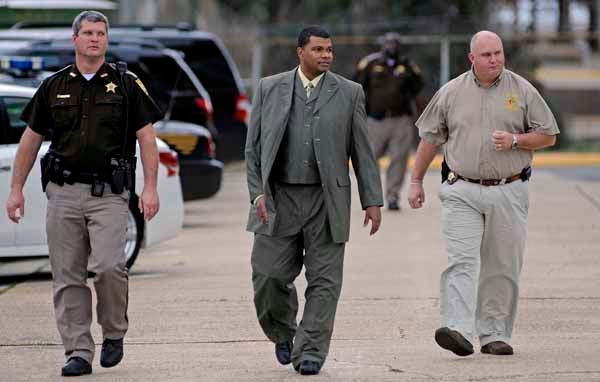Supreme Court seeks more info in Ellis motion
Published 10:59 pm Friday, June 13, 2014

Andre Ellis, center, walks to the Pike County Jail from the Pike County Courthouse after the morning session of his trial in Troy, Ala., Monday, Jan. 14, 2013. Ellis is accused of raping two women on March 26, 2012. (Photo/Thomas Graning)
A judge and defense attorney have two weeks to make their case to the Alabama Supreme Court regarding the decision to overturn the rape conviction of Andrew Lamar Ellis.
The court on Monday gave two weeks to submit written arguments regarding a motion filed by the Pike County District Attorney’s Office.
The motion, filed one year ago, challenged Circuit Court Judge Jeff Kelley’s jurisdiction and several of the issues he raised in May 2013 before overturning Ellis’ conviction.
“Of course, we’re pleased,” said Assistant District Attorney Chris Kaminski. “It means, at the very least, they’re entertaining the argument and that is all we ever wanted.”
Ellis was convicted in January 2013 of two counts of rape and one count of second-degree burglary and sentenced to concurrent terms of 85 years for each rape and 20 years for the burglary charge.
Both the Court of Criminal Appeals and the Supreme Court had dismissed the petition based on timeliness issues, saying the District Attorney’s Office failed to file the appeal of Kelley’s ruling within a seven-day window mandated by law. Their motion was filed in June 2013.
“We said ‘no, we disagree with you. You need to look at the case we are citing.’ We prosecuted this to the culmination of the case. The state only has rules of procedure if it applies to an appeal for pretrial matters,” explained District Attorney Tom Anderson in April, when he first learned the Supreme Court would hear the case. “This is the first time anyone will actually look at our motion.”
In overturning Ellis’ conviction and ordering a new trial, Kelley cited “inconsistency” in one victim’s testimony and “reasonable probability” that the results of the first trial would have been different if the state had disclosed other evidence.
The new trial will not be heard until the court’s rehearing of the motion is completed.
“While there is appellate action, there would be a stay in the matter,” said Anderson. Ellis is currently serving time for theft of property in the first degree.
Kelley and Ellis’ attorney have until June 23 to respond to the order. The District Attorney’s Office will have seven days from the dates they respond to reply to their response.




